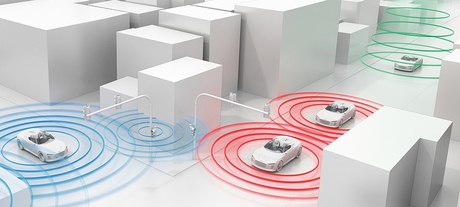5G comms for connected cars

The vehicle industry has formed a 5G connected-car communications consortium.
Car manufacturers and telecommunications companies have teamed up to form an association that aims to develop standards and solutions for future automotive communications systems.
The 5G Automotive Association comprises AUDI AG, BMW Group, Daimler AG, Ericsson, Huawei, Intel, Nokia and Qualcomm, with more companies expected to join.
In a statement released on 29 September, the association said it will “develop, test and promote communications solutions, support standardisation and accelerate commercial availability and global market penetration”.
It added that the goal is to “address society’s connected mobility and road safety needs with applications such as connected automated driving, ubiquitous access to services and integration into smart cities and intelligent transportation”.
“For the automotive industry it is essential that 5G fulfils the challenges of the era of digitalisation and autonomous driving,” said Dr Christoph Grote, senior VP Electronics, BMW Group.
“With the 5G Automotive Association we founded a cross-industry forum that allows us to shape the future 5G technology with leading ICT companies.”
The new association was announced on the same day that an economic analysis released by Australia’s peak driverless vehicle organisation — the Australian Driverless Vehicle Initiative (ADVI) — reported that Australia could “unlock $95 billion a year in economic value and generate 16,000 new jobs” by taking a more proactive ‘NBN-style’ approach to the introduction of autonomous vehicles in Australia.
Collaboration is key
According to Alfons Pfaller, head of Infotainment Development at AUDI AG, connected cars “will shape the future of individual mobility”, and next-generation mobile networks will take car-to-everything connectivity to a new level.
“The key to success is in cross-industry collaboration,” he said.
The 5G Automotive Association will address “key technical and regulatory issues, leveraging next-generation mobile networks and integrating vehicle platforms with connectivity, networking and computing solutions”. Its main activities will be:
- Defining and harmonising use cases, technical requirements and implementation strategies.
- Supporting standardisation and regulatory bodies, certification and approval processes.
- Addressing vehicle-to-everything technology requirements, such as wireless connectivity, security, privacy, authentication and distributed cloud architectures.
- Running joint innovation and development projects leading to integrated solutions, interoperability testing, large-scale pilots and trial deployments.
“With the creation of this association we will leverage our latest technology, 5G, and work closely together with the car industry to jointly develop solutions as well as provide input to regulation, certification and standardisation,” said Ulf Ewaldsson, chief technology officer, Ericsson.
“We are excited to be co-founder and to work with leading automotive companies shaping the connected car solutions for the future.”
“Cloud, communications and networking technologies and innovations have the potential to transform the car into a fully connected device to revolutionise the driver experience and address society’s mobility needs,” added Dr Marc Rouanne, Nokia’s chief innovation and operating officer.
Economic benefits
The ADVI report — authored by economist Brian Haratsis, executive chairman of ADVI’s program partner MacroPlanDimasi — argues that a coordinated industry and government-led approach is needed to mitigate the risks of rapid uncontrolled autonomous vehicle adoption from 2020.
“We have the high-tech research, design, testing and manufacturing capabilities to make us a leading exporter of mobility services and technology across the APAC region,” Haratsis said.
“By taking first mover advantage in this emerging global industry, we can not only mitigate the forecast 40,000 jobs to be lost in car manufacturing, but create a new specialised high-tech export market.”
According to the report, if the average $2 billion in assistance to car manufacturers between 1997 and 2012 was invested in intelligent mobility, direct employment could be doubled from 7500 to 15,000.
“Add that to the estimated baseline $80 billion economic saving from improved road safety and congestion thanks to autonomous vehicle technology and the incentives for swift and decisive action are clear,” said Haratsis.
The report found that growing Australia’s stake in the global intelligent mobility sector from 0.25 to 1% would inject $15 billion into the economy and create 7500 direct jobs and an additional 8500 indirect jobs.
Haratsis said a prime example of the sector’s growth potential was the more than 75 ADVI partner organisations collaborating on driverless technology, many of which were already leading the world in research and deployment.
ADVI is advocating for the development of a five-year funding and incentive package focused on research, development, demonstration and deployment similar to the $177 million (£100m) Intelligent Mobility Fund, which is predicted to fast track $1.6 trillion in productivity benefits.
Melbourne Metro Tunnel officially opens, featuring CBTC
The project is understood to feature Australia's first communications-based train control...
Solving the challenge of in-tunnel GNSS
GNSS signals are rendered useless in tunnels and other subterranean environments; an effective...
Ericsson improves wireless WAN for Sunswift Racing
Sunswift Racing is using technology from Ericsson Enterprise Wireless Solutions to provide...



